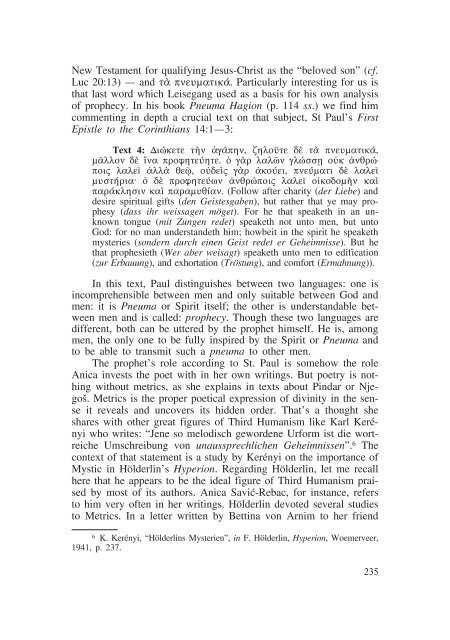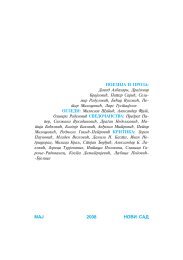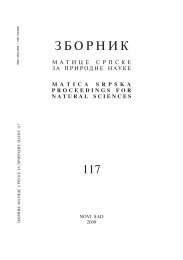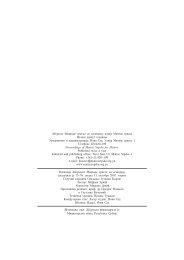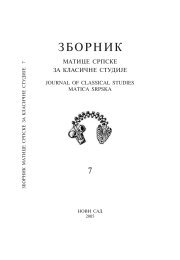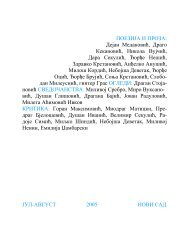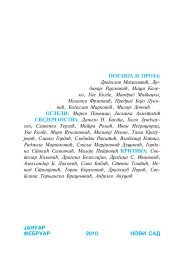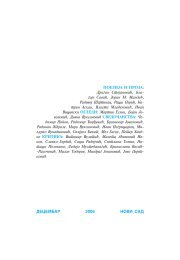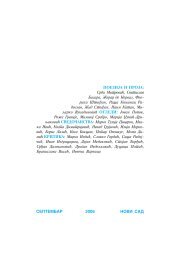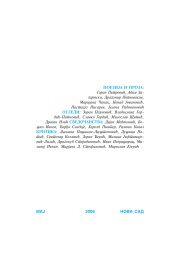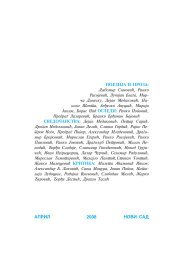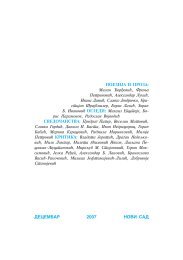Create successful ePaper yourself
Turn your PDF publications into a flip-book with our unique Google optimized e-Paper software.
New Testament for qualifying Jesus-Christ as the “beloved son" (cf.<br />
Luc 20:13) — and t2 pneymatikÀ. Particularly interesting for us is<br />
that last word which Leisegang used as a basis for his own analysis<br />
of prophecy. In his book Pneuma Hagion (p. 114 ss.) we find him<br />
commenting in depth a crucial text on that subject, St Paul's First<br />
Epistle to the Corinthians 14:1—3:<br />
Text 4: Di3kete t§n ÈgÀphn, zhlo‡te dÇ t2 pneymatikÀ,<br />
m©llon dÇ æna prochteÿhte. ã g2r lal%n gl3ssØ oœk Ènur3poij<br />
laleì Èll2 ue~, oœdeÆj g2r Èkoÿei, pneÿmati dÇ laleì<br />
myst0riaÞ ã dÇ prochteÿwn Ènur3poij laleì oøkodom§n kaÆ<br />
parÀklhsin kaÆ paramyuåan. (Follow after charity (der Liebe) and<br />
desire spiritual gifts (den Geistesgaben), but rather that ye may prophesy<br />
(dass ihr weissagen möget). For he that speaketh in an unknown<br />
tongue (mit Zungen redet) speaketh not unto men, but unto<br />
God: for no man understandeth him; howbeit in the spirit he speaketh<br />
mysteries (sondern durch einen Geist redet er Geheimnisse). But he<br />
that prophesieth (Wer aber weisagt) speaketh unto men to edification<br />
(zur Erbauung), and exhortation (Tröstung), and comfort (Ermahnung)).<br />
In this text, Paul distinguishes between two languages: one is<br />
incomprehensible between men and only suitable between God and<br />
men: it is Pneuma or Spirit itself; the other is understandable between<br />
men and is called: prophecy. Though these two languages are<br />
different, both can be uttered by the prophet himself. He is, among<br />
men, the only one to be fully inspired by the Spirit or Pneuma and<br />
to be able to transmit such a pneuma to other men.<br />
The prophet's role according to St. Paul is somehow the role<br />
Anica invests the poet with in her own writings. But poetry is nothing<br />
without metrics, as she explains in texts about Pindar or Njegoš.<br />
Metrics is the proper poetical expression of divinity in the sense<br />
it reveals and uncovers its hidden order. That's a thought she<br />
shares with other great figures of Third Humanism like Karl Kerényi<br />
who writes: “Jene so melodisch gewordene Urform ist die wortreiche<br />
Umschreibung von unaussprechlichen Geheimnissen". 6 The<br />
context of that statement is a study by Kerényi on the importance of<br />
Mystic in Hölderlin's Hyperion. Regarding Hölderlin, let me recall<br />
here that he appears to be the ideal figure of Third Humanism praised<br />
by most of its authors. Anica Saviã-Rebac, for instance, refers<br />
to him very often in her writings. Hölderlin devoted several studies<br />
to Metrics. In a letter written by Bettina von Arnim to her friend<br />
6 K. Kerényi, “Hölderlins Mysterien", in F. Hölderlin, Hyperion, Woemerveer,<br />
1941, p. 237.<br />
235


